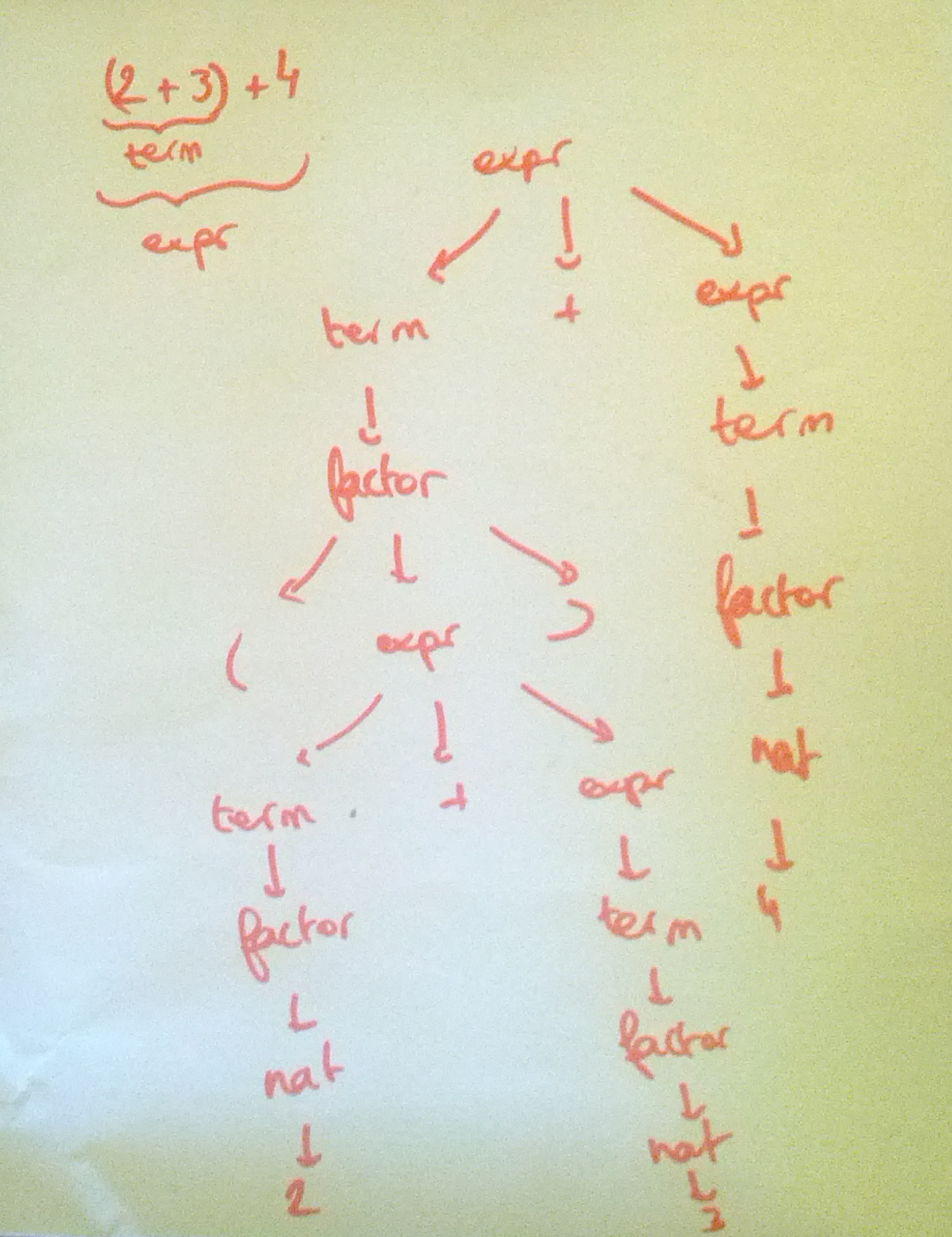Before being able to fool around on this chapter, here are some pre-requisites:
import Control.Monad import Data.Char(isDigit, isUpper, isLower, isAlpha, isAlphaNum, isSpace) newtype Parser a = P (String -> [(a,String)]) parse :: Parser a -> String -> [(a,String)] parse (P p) inp = p inp instance Monad Parser where -- return parser: always succeeds by returning the result value -- v without consuming the input return v = P (\inp -> [(v,inp)]) -- bind p >>= f = P (\inp -> case parse p inp of [] -> [] [(v,out)] -> parse (f v) out) instance MonadPlus Parser where -- fail mzero = P (\_ -> []) -- choice p `mplus` q = P (\inp -> case parse p inp of [] -> parse q inp [(v,out)] -> [(v,out)])
I will not enter into much detail here because monads will be presented later.
As always, you'll find the sources on github.
int :: Parser Int
The library file also defines a parser
int :: Parser Intfor an integer. Without looking at this definition, define int.Hint: an integer is either a minus symbol followed by a natural number, or a natural number.
The functions I will use to solve the problem:
many :: Parser a -> Parser [a] many p = many1 p +++ return [] many1 :: Parser a -> Parser [a] many1 p = do v <- p vs <- many p return (v:vs) sat :: (Char -> Bool) -> Parser Char sat p = do x <- item; if p x then return x else Parsers.fail nat :: Parser Int nat = do xs <- many1 digit return (read xs) space :: Parser () space = do many (sat isSpace) return () token :: Parser a -> Parser a token p = do space x <- p space return x natural :: Parser Int natural = token nat string :: String -> Parser String string [] = return [] string (x:xs) = do char x string xs return (x:xs) symbol :: String -> Parser String symbol s = token (string s)
I have a 'choice' between parsing a negative natural number (beginning with '-') or a positive natural number.
int :: Parser Int int = do symbol "-" n <- natural return (-n) +++ natural
Examples:
*Parsers> parse int "-1" [(-1,"")] *Parsers> parse int "-10" [(-10,"")] *Parsers> parse int "-101" [(-101,"")] *Parsers> parse int "101" [(101,"")] *Parsers> parse int " - 101" [(-101,"")]
comment :: Parser ()
Define a parser
comment :: Parser ()for ordinary Haskell comments that begin with the symbol – and extend to the end of the current line, which is represented by the control character ’\n’.
Here are the functions I will use to answer the question:
char :: Char -> Parser Char char x = sat (== x) alphanum :: Parser Char alphanum = sat isAlphaNum
Here is a first naive approach where you specify the characters you can read:
comment :: Parser () comment = do symbol "--" many (alphanum +++ char ' ') char '\n' return ()
*Parsers> parse comment "--ignoredcomment\nnotignored" [((),"notignored")] *Parsers> parse comment "--ignored comment till\nnotignored" [((),"notignored")] *Parsers> parse comment "--42 ignoredcomment till\nnotignored" [((),"notignored")]
Indeed, for some edge cases, this won't work:
*Parsers> parse comment "-- comment!@# that breaks\nnotignored" []
A simpler and better approach would be to parse anything that's not the ending control char '\n':
comment :: Parser () comment = do symbol "--" many (sat (/= '\n')) char '\n' return ()
*Parsers> parse comment "--comment!@# doesnotbreak\nnotignored" [((),"notignored")]
Draw Tree 1/2
Using our second grammar for arithmetic expressions, draw the two possible parse trees for the expression
2 + 3 + 4.
The grammar:
expr ::= expr + expr | term term ::= term * term | factor factor ::= (expr) | nat nat ::= 0 | 1 | ... |
2+3+4 can be read in 2 ways:
(2+3)+4
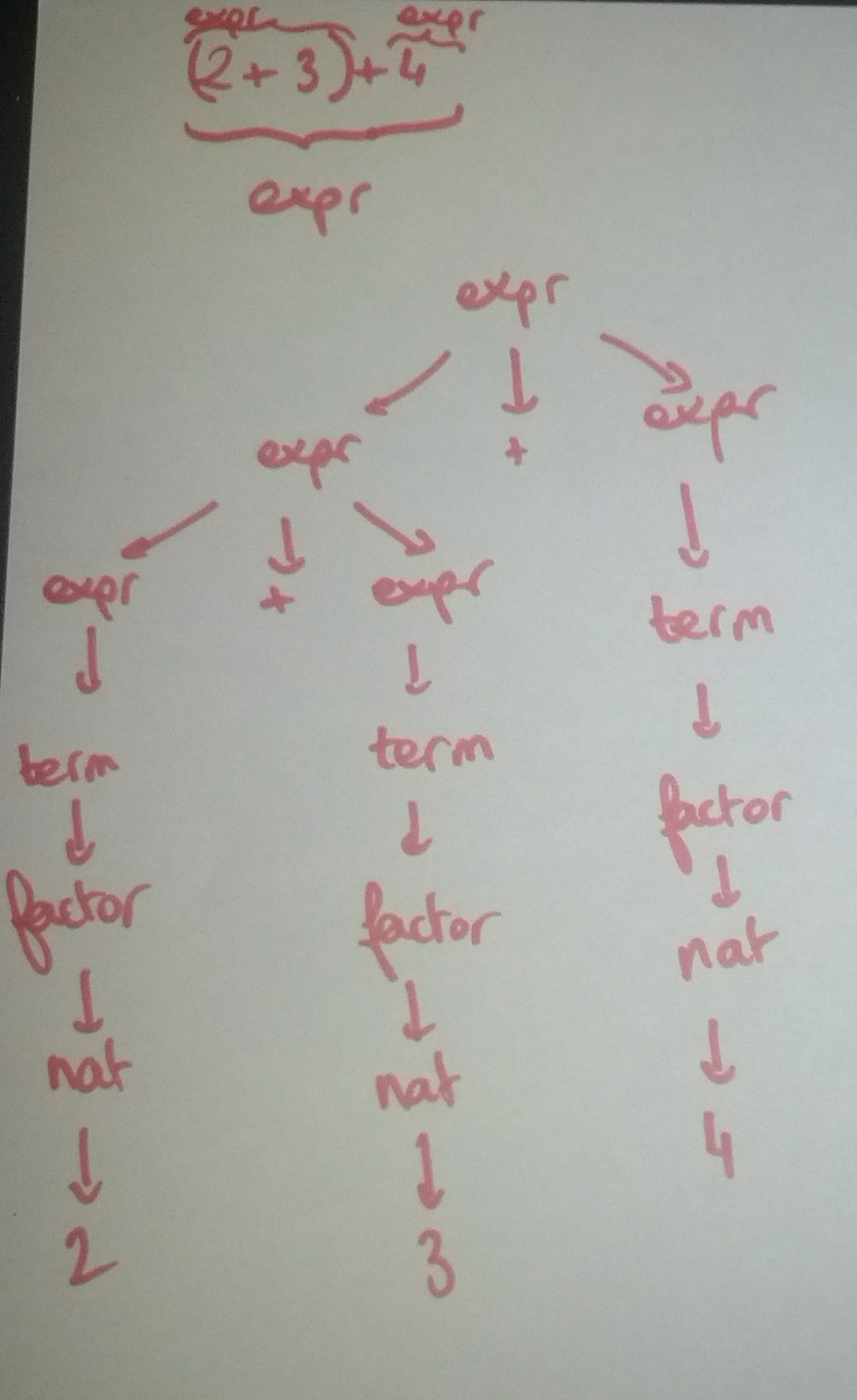
2+(3+4)
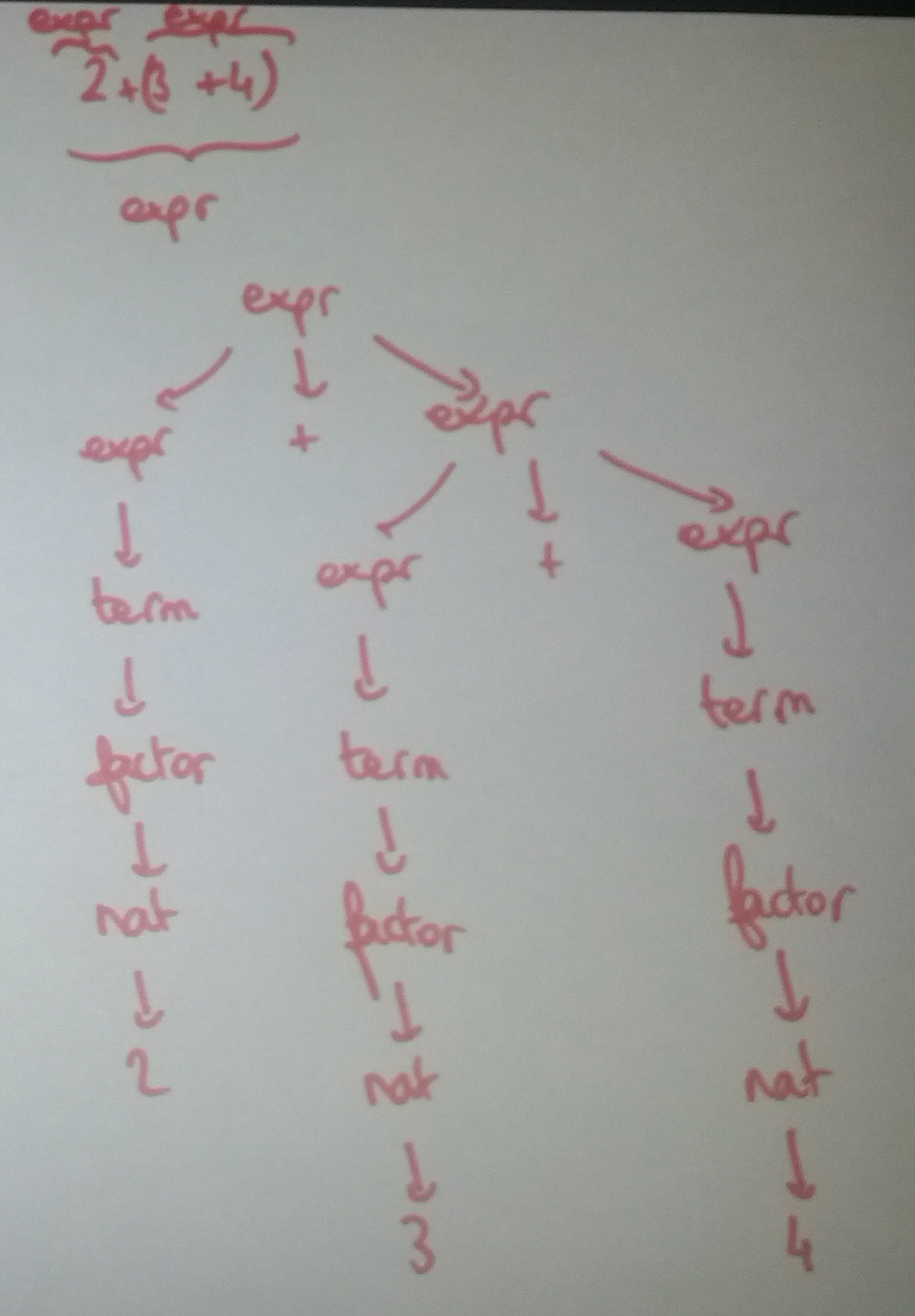
Draw Tree 2/2
Using our third grammar for arithmetic expressions, draw the parse trees for the expressions
2 + 3,2 ∗ 3 ∗ 4and(2 + 3) + 4.
The grammar:
expr ::= term (+ expr | epsilon) term ::= factor (* term | epsilon) factor ::= (expr) | nat nat ::= 0 | 1 | ... |
2+3
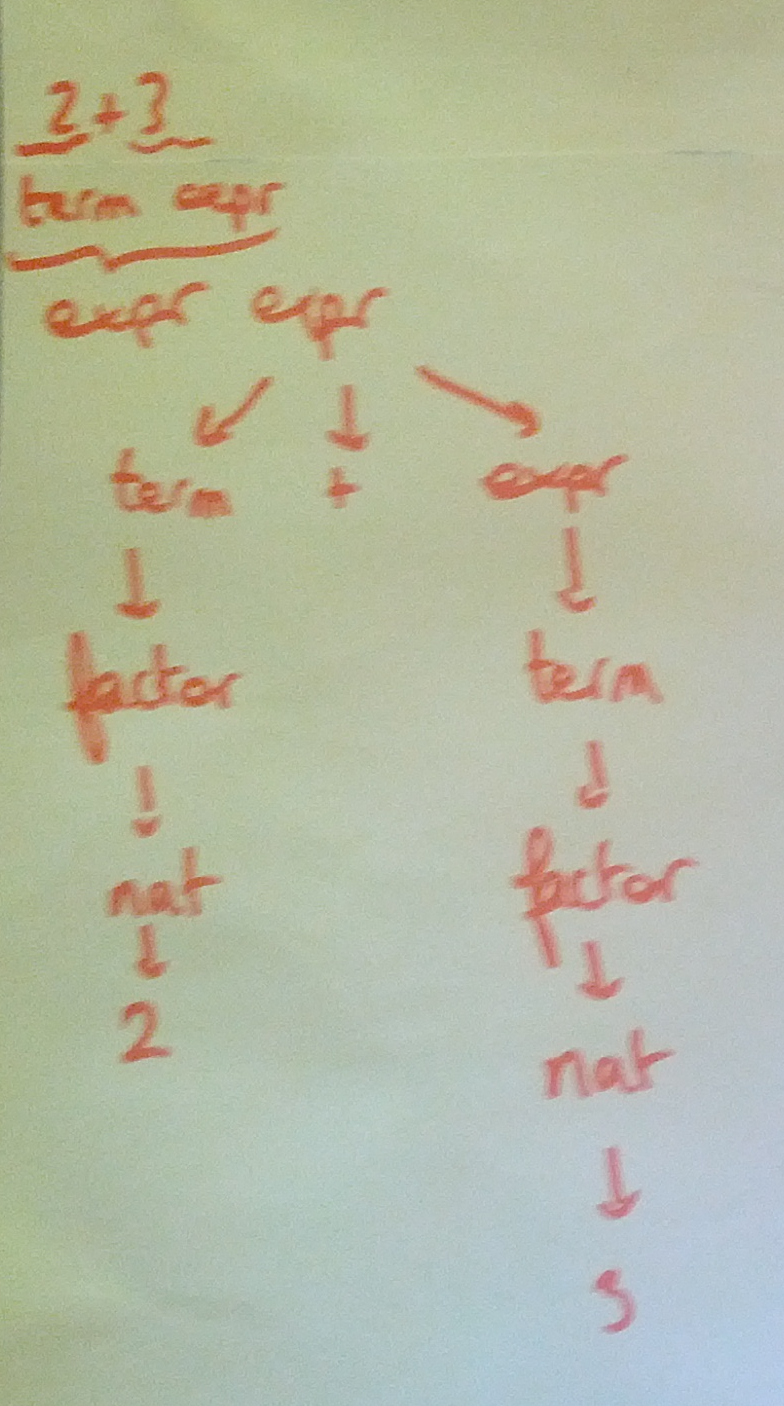
2*3*4
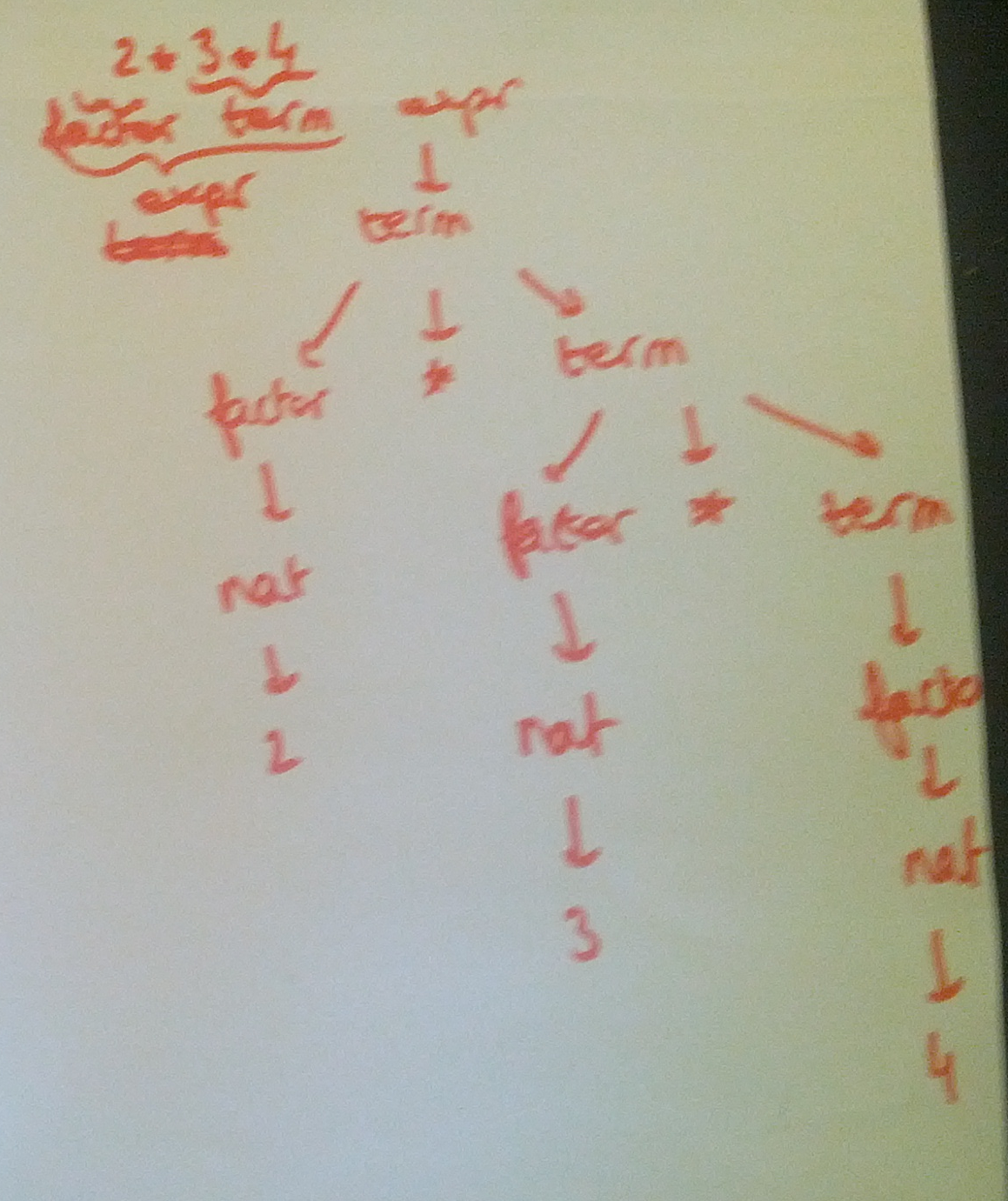
(2+3)*4
